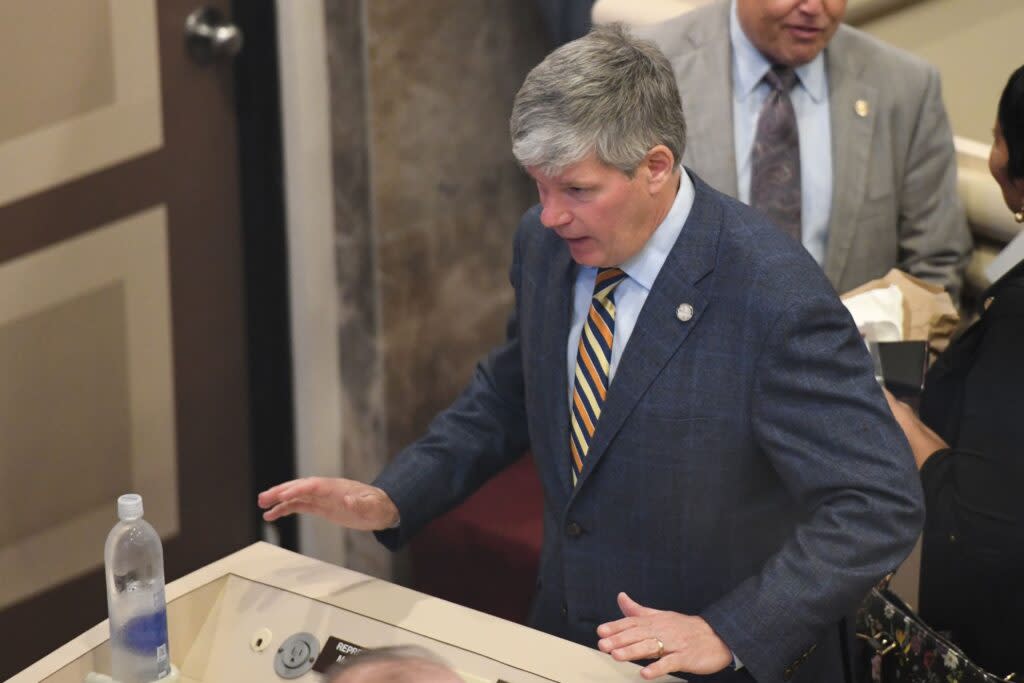Alabama House committee delays bill allowing parole applicants to participate in hearings

Rep. David Faulkner, R-Mountain Brook, speaks to a colleague on the floor of the Alabama House of Representatives on April 30, 2024 at the Alabama Statehouse in Montgomery, Alabama. (Brian Lyman/Alabama Reflector)
A bill to allow parole applicants to attend their hearings virtually and address the Alabama Board of Pardons and Paroles stalled in a House committee Wednesday after one legislator introduced major modifications to the legislation.
Rep. David Faulkner, R-Mountain Brook, tried to submit changes to SB 312, sponsored by Sen. Will Barfoot, R-Pike Road, during the House Judiciary Committee meeting. Faulkner’s amendment would allow members of the board to exclude parole applicants if they think it would affect victims.
Faulkner also proposed changing the bill to allow the Board to use telephone communications in the first year followed by video conferencing the year after to give the Alabama Bureau of Pardons and Paroles time to set a system and a protocol. He also changed the language in the bill to leave the decision up to the board.
“In the effort of time, in trying to get it to the committee in time with a potential amendment, it became a lot easier if you didn’t make it a requirement, but you started pushing the parole board to do this, meaning to set up a system to make sure they had time to have the system in place,” Faulkner said in an interview after the meeting.
The bill cleared the Senate April 25 on a unanimous vote.
The legislation requires the board to allow parole applicants to participate in parole hearings virtually through video conferencing or other communication means. It suspends the hearing if the communication system fails and allows applicants to waive their rights to attend.
SB 312 was amended in the Senate so that the applicant will not be allowed to see, hear, or interact with the victim; the victim’s family members, or those advocating for the victim.
Victims of Crime and Leniency (VOCAL), a nonprofit organization that supports victims and victims’ rights, said the bill could force victims to recollect the traumatic events should the parole applicant be allowed to participate in the hearing.
“We are troubled and concerned by the bill,” said Wanda Miller, the executive director of VOCAL, in an interview after the meeting.
Others, including Redemption Earned, based in Birmingham, were surprised by the events that transpired on the committee after having advocated for SB 312’s passage.
“This bill would just provide them (parole applicants) the essence of fairness, the right to be virtually present,” said former Alabama Supreme Court Chief Justice Sue Bell Cobb, the executive director of Redemption Earned. “I am disappointed that a bill that passed the Senate unanimously, that there is this much consternation on the committee, particularly around the fact of simply just trying to deprive worthy, prospective parolees the opportunity to have something they have earned.”
She also said that allowing the parole applicant to participate in the hearing would have minimal impact on the victim.
“The victims won’t even know,” Cobb said. “The cameras will be focused on the board. They will not know they are there.”
Faulkner submitted his proposal during the final moments in committee as the bill was under consideration, surprising many of the legislators on the committee.
Rep. Matt Simpson, R-Daphne, almost immediately moved to introduce an amendment to Faulkner’s substitute, changing it back to the original version but keeping the provision to allow applicants to participate in their hearings by telephone and later move to video conferencing.
“If someone is going to talk about my future, at least let me hear what they are saying,” Simpson said. “If the parole board says, ‘listen, you are not behaving in prison, you are not following what you are supposed to do, you’ve got too many disciplinaries, you have got too many of these things going on, you haven’t done this, get your GED, get a trade, get a skill,’ at least the person had the opportunity to hear from the parole board what they can do for the time they need to show up next time.”
Rep. Jim Hill, R-Odenville, chair of the Judiciary Committee, also disagreed, telling committee members that while he was a judge, people would appear in court whenever a judgment was made regarding their future.
The ranking Democrat on the committee, Rep. Chris England, D-Tuscaloosa, vehemently opposed Faulker’s proposal.
“Currently, the parole board has absolutely no oversight, none,” he said. “We know there have been instances where they have not followed the law in terms of set aside. We know there have been instances where they don’t go by guidelines. We also know there have been instances where the process has been abused to the detriment of the applicant.”
Others on the committee, including Rep. Jerry Starnes, R-Prattville, said that parole applicants have other chances to address the committee. They can submit letters or written statements. Staff may also interview them to gauge how prepared they are to be released.
The House Judiciary Committee is scheduled to meet on the bill Thursday morning.
The post Alabama House committee delays bill allowing parole applicants to participate in hearings appeared first on Alabama Reflector.

